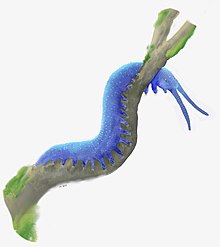Cretoperipatus
| Cretoperipatus Temporal range: Cenomanian-Turonian
| |
|---|---|

| |
| Scientific classification | |
| Domain: | Eukaryota |
| Kingdom: | Animalia |
| Phylum: | Onychophora |
| Family: | Peripatidae |
| Genus: | †Cretoperipatus Engel & Grimaldi, 2002 |
| Species: | †C. burmiticus
|
| Binomial name | |
| †Cretoperipatus burmiticus | |
Cretoperipatus burmiticus is an extinct species of velvet worm that is known from the Burmese amber in Kachin state of Myanmar, originating from the Cenomanian-Turonian stages of the Late Cretaceous.[1]
Taxonomy
[edit]The species can be assigned to one of the modern families, the Peripatidae.[1] While only five leg pairs can be discerned, the information gained from the fossil is enough to preclude assignment to any known modern genus.
Paleontology
[edit]The specimen of Cretoperipatus burmiticus is one of the two fossils confidently assigned to as onychophorans, along with the Late Carboniferous species Antennipatus.[2][3]
It was hypothesised that onychophorans could have migrated from Gondwana to Southeast Asia via the northwards drift of India. Research published in 2016 concluded that the age of Burmese amber supports an earlier migration through Europe. The same study also came to the conclusion that Typhloperipatus williamsoni is the closest extant relative of Cretoperipatus.[4]
References
[edit]- ^ a b Grimaldi, David A.; Engel, Michael S.; Nascimbene, Paul C. (March 2002). "Fossiliferous Cretaceous Amber from Myanmar (Burma): Its Rediscovery, Biotic Diversity, and Paleontological Significance". American Museum Novitates (3361): 1–71. doi:10.1206/0003-0082(2002)361<0001:FCAFMB>2.0.CO;2. hdl:2246/2914. S2CID 53645124.
- ^ Garwood, Russell J.; Edgecombe, Gregory D.; Charbonnier, Sylvain; Chabard, Dominique; Sotty, Daniel; Giribet, Gonzalo (2016). "Carboniferous Onychophora from Montceau-les-Mines, France, and onychophoran terrestrialization". Invertebrate Biology. 135 (3): 179–190. doi:10.1111/ivb.12130. ISSN 1077-8306. PMC 5042098. PMID 27708504.
- ^ Giribet, Gonzalo; Buckman-Young, Rebecca S.; Costa, Cristiano Sampaio; Baker, Caitlin M.; Benavides, Ligia R.; Branstetter, Michael G.; Daniels, Savel R.; Pinto-da-Rocha, Ricardo (2018). "The 'Peripatos' in Eurogondwana? – Lack of evidence that south-east Asian onychophorans walked through Europe". Invertebrate Systematics. 32 (4): 840–863. doi:10.1071/IS18007.
- ^ Oliveira, I. S.; Bai, M; Jahn, H; Gross, V; Martin, C; Hammel, J. U.; Zhang, W; Mayer, G (2016). "Earliest Onychophoran in Amber Reveals Gondwanan Migration Patterns". Current Biology. 26 (19): 2594–2601. Bibcode:2016CBio...26.2594O. doi:10.1016/j.cub.2016.07.023. PMID 27693140.
External links
[edit] Data related to Cretoperipatus at Wikispecies
Data related to Cretoperipatus at Wikispecies
- Prehistoric onychophorans
- Late Cretaceous invertebrates
- Cretaceous invertebrates of Asia
- Monotypic onychophoran genera
- Onychophorans of southeast Asia
- Burmese amber
- Fossil taxa described in 2002
- Taxa named by Michael S. Engel
- Cenomanian genera
- Late Cretaceous animals of Asia
- Cretaceous animal stubs
- Onychophoran stubs
